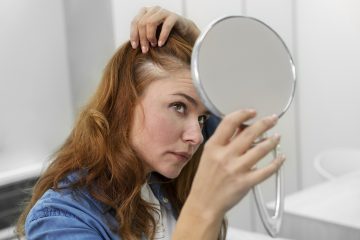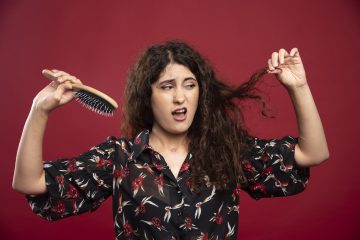Introduction
Hair loss is a common concern among women of all ages. Whether it’s thinning hair, receding hairline, or excessive shedding, losing hair can significantly impact a woman’s self-esteem and confidence. Understanding the causes of hair loss is the first step towards finding effective treatment options.
There are various reasons why women experience hair loss. Hormonal imbalances, such as in cases of polycystic ovary syndrome (PCOS) or menopause, can disrupt the natural hair growth cycle. Nutritional deficiencies, stress, and certain medications can also contribute to hair loss.
Fortunately, there are treatment options available to address women’s hair loss. From over-the-counter topical treatments to prescription medications, there are remedies that can stimulate hair growth and prevent further loss. In addition, lifestyle changes, such as a healthy diet rich in vitamins and minerals, can also play a significant role in promoting hair health.

If you’re struggling with hair loss, it’s important to consult with a healthcare professional or a dermatologist to accurately diagnose the cause and determine the most suitable treatment plan. This article will delve deeper into the common causes of hair loss in women and highlight effective treatment options to help you regain your confidence and achieve healthy hair.
Understanding the common causes of hair loss
Hair loss in women can have various causes, and it’s essential to understand them in order to address the issue effectively. Hormonal factors, nutritional deficiencies, stress, and medical conditions can all contribute to hair loss. By identifying the underlying cause, you can take appropriate steps to manage and treat your hair loss.
Hormonal factors and hair loss:
Hormonal imbalances can have a significant impact on a woman’s hair health. Conditions such as polycystic ovary syndrome (PCOS) or menopause can disrupt the natural hair growth cycle, leading to thinning or shedding hair. These hormonal changes can result in an increase in androgen levels, which can trigger hair loss.
Nutritional deficiencies and hair loss:
A balanced diet plays a crucial role in maintaining healthy hair. Nutritional deficiencies, such as iron, zinc, or biotin deficiency, can contribute to hair loss in women. Iron is essential for carrying oxygen to the hair follicles, while zinc promotes hair growth and repair. Biotin, also known as vitamin B7, helps strengthen the hair shaft and prevent breakage.

Stress and hair loss:
Stress can have a profound impact on our overall health, including our hair. When you experience significant stress, your body produces more cortisol, also known as the stress hormone. Elevated cortisol levels can disrupt the hair growth cycle, leading to hair loss. Managing stress through relaxation techniques, exercise, and self-care can help minimize hair loss caused by stress.
Medical conditions that can cause hair loss:
Certain medical conditions can contribute to hair loss in women. Autoimmune disorders, such as alopecia areata, can cause patchy hair loss, while thyroid disorders can result in overall thinning of the hair. It’s important to consult with a healthcare professional to properly diagnose and treat any underlying medical conditions that may be causing your hair loss.
Treatment options for hair loss in women
Thankfully, there are several treatment options available to address hair loss in women. Depending on the underlying cause, your healthcare professional may recommend different approaches to stimulate hair growth and prevent further loss.

Over-the-counter products for hair loss:
There are numerous over-the-counter products specifically designed to combat hair loss in women. These products often contain ingredients such as minoxidil, which can help promote hair growth. It’s important to carefully follow the instructions and be consistent with the use of these products to achieve optimal results.
Prescription medications for hair loss:
In more severe cases of hair loss, your healthcare professional may prescribe medications to promote hair growth. Finasteride, originally used to treat prostate issues, can also be effective in stimulating hair growth in women. However, it’s essential to discuss any potential side effects or risks with your healthcare professional before starting any prescription medication.
Natural remedies and lifestyle changes for hair loss management:
Alongside medical treatments, there are natural remedies and lifestyle changes that can help manage hair loss. A balanced diet rich in vitamins and minerals, such as iron, zinc, biotin, and vitamin D, can promote healthy hair growth. Regular scalp massages, avoiding harsh hair treatments, and reducing stress can also contribute to maintaining hair health.
Conclusion
In conclusion, hair loss can be a distressing experience for women, impacting their self-esteem and confidence. However, by understanding the common causes of hair loss and exploring the available treatment options, you can take proactive steps to address the issue and regain your confidence. Remember to consult with a healthcare professional or dermatologist to accurately diagnose the cause of your hair loss and determine the most suitable treatment plan. With the right approach, you can achieve healthy hair and boost your self-confidence once again.
